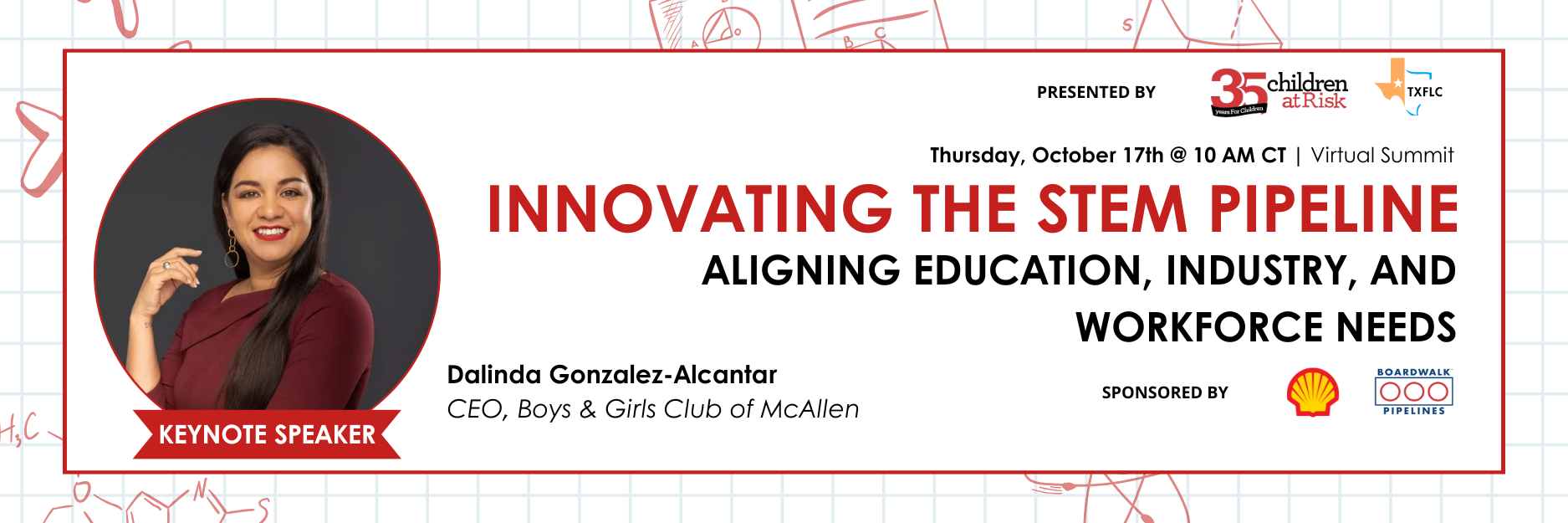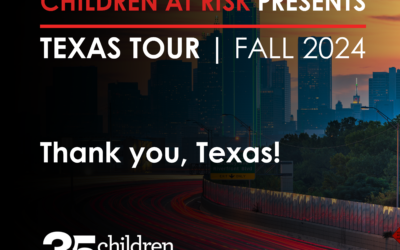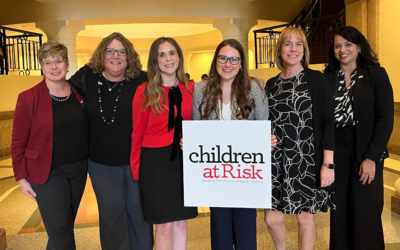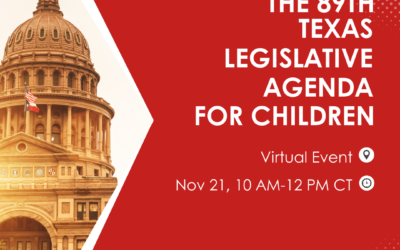
This post was written by Susannah Young, Associate Director of PreK-12 Education, CHILDREN AT RISK.
On Thursday, October 17th, CHILDREN AT RISK (C@R), Texas Family Leadership Council, Shell, and Boardwalk Pipelines hosted the annual STEM Summit, “Innovating the STEM Pipeline: Aligning Education, Industry, and Workforce Needs.” This virtual summit gathered educators, industry leaders, and policy experts to discuss the future of STEM in Texas and explore innovative strategies to prepare students for high-demand, evolving career fields like automation, AI, and data science. With a focus on building a cradle-to-career pipeline, the event highlighted Texas’s commitment to developing STEM talent and aligning educational pathways with future workforce demands.
The summit began with Diana Del Pilar, Chief of School Performance at CHILDREN AT RISK, who shared a data-driven insight into Texas’s STEM landscape. “Texas offers an expansive landscape of opportunity for those pursuing STEM careers. For anyone that is, regardless of their education level, we have a strong growth in employment opportunities, with an expected growth of about 1.5 million opportunities over the next 10 years.” Del Pilar underscored the need for equity in access and achievement across STEM disciplines, especially regarding gender and racial access in advanced courses.
Parents want the best for their kids, but many just don’t know what questions to ask or which professions are out there.
Moderated by Amy Draper, Deputy Director of Programs at Educate Texas, the opening session “Building Strategic Partnerships for a Strong STEM Pipeline from Cradle to College and Career” featured Dr. Martha Salazar-Zamora, Superintendent of Tomball ISD, and several other education leaders. Susan Harris of the Health Care Alliance emphasized the value of partnerships with industry leaders like HCA, saying, “Everybody is very excited to have the students in here and help them grow… and develop the skills they need.” Bob Thompson, Dean of Student Advancement at Tomball ISD, echoed this sentiment, describing how hands-on experiences give students essential skills and mentorship: “The work-based learning experiences outside of the classroom allow kids to apply those skills and build social capital through credentials and networking.”
In the second session, “Building Momentum to STEM Careers,” participants discussed how dual credit, Career and Technical Education (CTE), and P-TECH programs provide pathways to both university STEM degrees and workforce readiness. Kenya Wilson, Director of College and Career Readiness Programs at Educate Texas, noted, “Texas is leading the way in developing a tri-agency board… K-12 systems, higher ed, and our workforce commission are all working together to create seamless pathways for students.” Sara Mann from Alamo College highlighted the importance of active industry partnerships in P-TECH programs, stating, “Our most successful P-TECH programs have industry partners who are active members of advisory boards from the initial planning stages.” Dr. Ragina Taylor, STEM Facilitator for Grand Prairie ISD, stressed the value of student involvement in planning, pointing out, “We’ve had advisory boards without student input, but student involvement is critical.”
The keynote speaker, Dalinda Gonzalez-Alcantar, CEO of Boys & Girls Club of McAllen, illustrated the importance of parent and community engagement in supporting STEM pathways. “Parents want the best for their kids, but many just don’t know what questions to ask or which professions are out there,” she explained. She shared how the Boys & Girls Club helps students continue their education and earn credentials without having to choose between work and school, providing opportunities that improve students’ economic stability. Reflecting on the importance of language inclusivity, she added, “Filling that STEM pipeline faster means respecting students’ home language and cultural backgrounds.”
An inspiring vision of STEM’s future was presented by futurist speaker Alexandra Whittington. She urged attendees to think expansively about STEM’s role in shaping Texas’s future, from clean energy and automation to the rapid evolution of smart cities and the potential impacts of climate change on Texas industries.
The final session, moderated by Kara Branch, CEO of Black Girls Do Engineer, spotlighted emerging STEM careers in Texas and how the education system must evolve to prepare students for roles in automation, AI, and data science. Akanksha Mehrotra, CVP of AI and Enterprise Marketing, emphasized the essential nature of adaptability and critical thinking in today’s AI-driven era. Kekeli Ekoue-Kovi from Baker Hughes discussed the impact of community engagement on student aspirations, stating, “Our ERGs connect with schools and host STEM events, giving students real insights into our work.” Matthew Cushing, Executive Director of Rice University’s Office of STEM Engagement, highlighted the importance of early engagement: “Building the future STEM pipeline means engaging students as young as kindergarten to cultivate problem-solving skills and computational thinking.” Dr. Srimoyee Bhattacharya from Shell USA concluded the discussion by stressing the need for mentorship, saying, “Schools should partner with professionals to demystify STEM fields and make them accessible to a wider range of students.”
The summit’s closing remarks reinforced the significance of a cradle-to-career approach in preparing students for evolving STEM fields and workforce demands. Dr. Marcos Silva, CHILDREN AT RISK’s Chief Strategy Officer, concluded, “Texas has a responsibility to prepare our students for careers that are evolving faster than ever, and that means ensuring they have early, sustained access to STEM education.”
With Texas poised to lead in industries like renewable energy, technology, and healthcare, the summit underscored the importance of aligning STEM and P-TECH programs with the future job market. By fostering partnerships across sectors, providing hands-on learning opportunities, and promoting diversity and inclusion in STEM fields, Texas is creating a stronger, more resilient STEM pipeline to support the state’s economy and prepare students for success in the 21st century.
Thank you to all partners, speakers, and attendees for their contributions to this crucial conversation. Together, we are building a brighter STEM future for Texas.
WATCH THE RECORDING
READ MORE FROM C@R
Charting Success
Charting Success Evaluating the Classroom Experiences of Children of Immigrants in TexasOur children are charting a new course for America. They are at the leading edge of the nation’s growing diversity. Approximately 53% of the U.S. population under age 18 belonged...
Fall 2024 Early Childhood Texas Tour Concludes
Driving Solutions Across Texas: Fall 2024 Texas Tour RecapWritten by Lyn Lucas, Associate Director, Early Childhood Education, CHILDREN AT RISK This fall, CHILDREN AT RISK hit the road for our statewide Texas Tour, sparking critical conversations on the future of...
C@R Hosts State of Disconnection Legislative Briefing on Public Education
A State of Disconnection C@R Hosts Legislative Briefing to address challenges in public education and youth disconnectionOn Friday, November 15th, CHILDREN AT RISK hosted a Legislative Briefing at the Texas Capitol to address two critical challenges facing Texas...
C@R Hosts 89th Texas Legislative Agenda for Children
This post was written by Briauna Derry, Director of Media Activism, CHILDREN AT RISK.On November 21, CHILDREN AT RISK, in partnership with the Texas Family Leadership Council, hosted the 89th Texas Legislative Agenda for Children Summit, bringing together experts,...
Harris County Early Learning Quality Network (ELQN) Announces Next Project Phase to Invest in Early Learning Environments
Harris County Early Learning Quality Network (ELQN) Announces Next Project Phase to Invest in Early Learning Environments Expanding Child Care Quality Efforts with Release of Vendor Requests for Proposals (RFPs) Media Contact: Rashena Franklin, 713.301.4577 (Harris...
Winter 2024 Newsletter | The Children’s Immigration Network
The Children's Immigration Network is CHILDREN AT RISK's effort to focus on children of immigrants. Our vision is for the state of Texas to offer a welcoming environment for immigrants and refugees where children of immigrants can integrate and access the resources...





